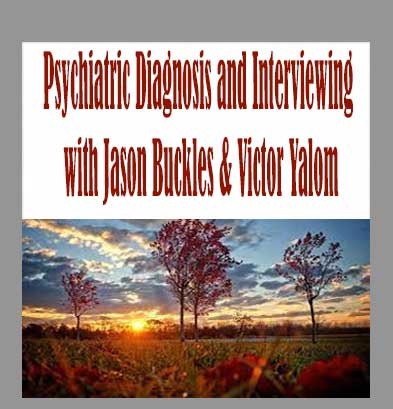
Description
Psychiatric Diagnosis and Interviewing with Jason Buckles & Victor Yalom download , Psychiatric Diagnosis and Interviewing with Jason Buckles & Victor Yalom review , Psychiatric Diagnosis and Interviewing with Jason Buckles & Victor Yalom free
Psychiatric Diagnosis and Interviewing with Jason Buckles & Victor Yalom
In this first volume of our new series, The DSM 5 and Psychodiagnostic Interviewing, Jason Buckles and Victor Yalom take a nuanced and critical look at psychiatric diagnosis and the DSM-5, and then demonstrate in a step-by-step manner the components and skills necessary to do a diagnostic interview.
Whether you love the DSM or hate it, as a clinician you need to understand how to use it and how to avoid misusing it. The best clinicians seamlessly combine diagnostic interviewing and excellent rapport-building during the initial session, and in this video you’ll learn how to do just that.
Volume 1 of this comprehensive series begins with Jason Buckles and Victor Yalom digging deep into some of the most fundamental questions in the field of mental health: What is a mental disorder? What is a diagnosis? What are the benefits as well as the drawbacks of conceptualizing human problems as disorders? Is it appropriate to use the medical model to treat mental illness? What are some of the dangers of diagnosing culturally normative behaviors as disorders? The many valuable uses of our diagnostic system—from having a common language among professionals, to securing insurance coverage, to scientific research—are seamlessly woven into their dynamic discussion as well.
In the second half of the video, you’ll get clear step-by-step instructions, illustrated with short clinical demonstrations, of the various components of doing a diagnostic interview: How do you introduce the interview to the client and get their consent? How can you ask the necessary questions to both hone in on a particular diagnosis and rule out others? How do you push a client for more specific information while also being mindful of attending to the alliance, especially in the first session? And finally, how do you bring it all together, weighing the information you’ve obtained to decide what their diagnosis is, or isn’t, while keeping in mind that not all clients seeking help meet the criteria for a diagnosis?
This is the only series of its kind to take a complex and critical approach to the DSM, and Buckles and Yalom manage a delicate balance—neither cheerleading for the DSM nor taking a slash-and-burn approach. You are certain to have a better understanding of the DSM-5 and psychodiagnostic interviewing after watching it.
In Depth
Most trainings on the DSM-5 are dreaded by clinicians because they are, to put it bluntly….well, boring. The presenter may note in passing that there was some controversy at the time of its publication, but then quickly move on to almost rote recitation of the major diagnoses and their accompanying criteria. This series takes a refreshingly different approach, and Volume 1 lays the foundation by offering an in-depth discussion of the fundamental assumptions behind psychiatric diagnosis in general, and the DSM in particular.
Whatever your attitude towards the DSM, you most likely need to use it in your work, so it certainly behooves you to understand both the benefits and potential drawbacks of psychiatric diagnoses, and then how to properly conduct an interview so you can come up with the most accurate diagnosis possible. Or, as Buckles repeatedly reminds us, you should always keep in mind the possibility that clients may not meet the criteria for a diagnosis, and if not, you need to be able to clearly articulate why not. This highly acclaimed video takes you through the following topics in an engaging and thought provoking manner:
• What is a Psychiatric Diagnosis?
• Benefits of a Psychiatric Diagnosis
• Critiques of Psychiatric Diagnosis and the DSM
• Conducting a Diagnostic Interview
• Observing Client Behavior and Presentation
• Ruling out Other Conditions
• Assessing Suicidality
Specs
Length of video: 2:00:00
English subtitles available
Bios
Jason Buckles, PhD, earned his Bachelor’s in Psychology at New York University in 1992. While there he worked on psychiatric diagnostic projects at Bellevue Hospital and the New York Psychiatric Institute. He earned his Master’s in Counseling at The University of New Mexico in 2001 and PhD at The University of New Mexico in 2016. Buckles has a private mental health counseling practice and behavior consultation agency specializing in supports for people with intellectual disability and concurrent mental health diagnoses. From 2012 through 2016 he was the statewide clinical director of the New Mexico Department of Health—Bureau of Behavioral Support. Since late 2016 he has been the executive director of A Better Way of Living, an agency that provides life-wide supports for people with intellectual disability and concurrent behavioral and/or mental health conditions. He has taught psychiatric assessment and diagnosis at New Mexico Highlands University since 2002 and in the Special Education department at The University of New Mexico since 2015.
Victor Yalom, PhD has produced over 100 videos, conducted workshops in existential-humanistic and group therapy in the US, Mexico, and China, and currently leads consultation groups for therapists.
Learning Objectives:
- Describe the fundamental elements of a mental disorder
- List the sequential elements of a diagnostic interview
- Recite the uses for and critiques of the DSM diagnostic system
Frequently Asked Questions:
- Innovative Business Model:
- Embrace the reality of a genuine business! Our approach involves forming a group buy, where we collectively share the costs among members. Using these funds, we purchase sought-after courses from sale pages and make them accessible to individuals facing financial constraints. Despite potential reservations from the authors, our customers appreciate the affordability and accessibility we provide.
- The Legal Landscape: Yes and No:
- The legality of our operations falls into a gray area. While we lack explicit approval from the course authors for resale, there’s a technicality at play. When procuring the course, the author didn’t specify any restrictions on resale. This legal nuance presents both an opportunity for us and a boon for those seeking budget-friendly access.
- Quality Assurance: Unveiling the Real Deal:
- Delving into the heart of the matter – quality. Acquiring the course directly from the sale page ensures that all documents and materials are identical to those obtained through conventional means. However, our differentiator lies in going beyond personal study; we take an extra step by reselling. It’s important to note that we are not the official course providers, meaning certain premium services aren’t included in our package:
- No coaching calls or scheduled sessions with the author.
- No access to the author’s private Facebook group or web portal.
- No entry to the author’s exclusive membership forum.
- No direct email support from the author or their team.
We operate independently, aiming to bridge the affordability gap without the additional services offered by official course channels. Your understanding of our unique approach is greatly appreciated.
- Delving into the heart of the matter – quality. Acquiring the course directly from the sale page ensures that all documents and materials are identical to those obtained through conventional means. However, our differentiator lies in going beyond personal study; we take an extra step by reselling. It’s important to note that we are not the official course providers, meaning certain premium services aren’t included in our package:
Refund is acceptable:
- Firstly, item is not as explained
- Secondly, Item do not work the way it should.
- Thirdly, and most importantly, support extension can not be used.
Thank you for choosing us! We’re so happy that you feel comfortable enough with us to forward your business here.








Reviews
There are no reviews yet.